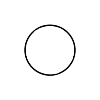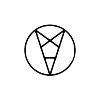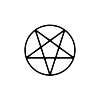Mr. Sophistication, Hell, & Rothko
We’re heading into fall, Halloween’s just visible on the horizon, and I can feel things beginning to get more supernatural around here. But first, a provocation from Lars von Trier . . .

From the Grave.
Three ideas from horror cinema's past.
I want to be clear that this treatment of The House That Jack Built should not be construed as a recommendation (see “Living Deliciously” below for one of those). I typically write about movies I think are valuable, which are usually movies I like, but this one is different. The House That Jack Built (medium spoilers follow) is a puzzle, has real merits, and provides lots of fuel for conversation, but it's also pretty damn disturbing. I found myself, at times, wincing and watching the clock. View at your own risk.
- Matt Dillon’s Jack, a serial killer known as “Mr. Sophistication,” has very little of the aura serial killers tend to acquire in popular cultural products—in movies, books, and TV. His crimes and behaviors echo the standard thriller's serial killer in several ways—he sees his crimes as artworks, he sends notes to the press, his kills have creative and bizarre conceptual structures, he’s obsessed with culture and history—but he draws none of the usual fascination. The issue is, he’s just so visible. We’re with him all the time. We know him and we see how broken he is. (In this sense, Jack is following in Henry: Portrait of a Serial Killer's footsteps) We also see how bumbling he is, getting away with his crimes through luck and through the general indifference of the cold world he inhabits. When the killer is not behind a curtain, there’s less possibility of mystique, of charisma. It’s the difference, often, between movie killers and true crime killers. The real people are sad, gross, often stupid—there isn’t much there. Popular media's killers thrive in the shadows.
- If the movie serial killer is a master of ceremonies—dungeon master, puzzle crafter, thematic engine—we can't quite say this character is absent from The House That Jack Built. This is a movie full of clues, questions, and mysteries. It’s a collage of horror, comedy, revolting imagery, allusions to Dante, documentary footage, and paintings. There are always the questions: “What is this about?” and “Why is this happening?” The figure in the shadows with the plan, whose dark charisma leads the way, isn’t Jack—it’s von Trier. And it’s his hand subjecting us to kill after kill. The auteur is the serial killer here. Jack is just his weapon.
- If someone were to ask me how I felt about this movie, the first words out of my mouth would probably be, “It sucks.” The House That Jack Built is simply one of the more unpleasant viewing experiences of my life. It’s a movie filled with sickening crimes, corpses, and, to top it off, documentary clips from real historical atrocities. It’s hard not to attribute this to two impulses I have little sympathy for: sadism and simple “shock the bourgeoisie” provocation. And yet violence is commonplace in our media, and it’s usually easy viewing. Here it is not. Of all the movies and TV shows about serial killers, the visceral experience here is unique. Violence is awful, and its awfulness is felt—even more so, in some respects, than in a predecessor like Henry. The House That Jack Built calls out all the slick, lightweight visions of murder we’re used to. This is what it's really like. Revulsion is a powerful thing. It can be unbearable, but it carries meaning well.

Right Behind You.
A thought on horror's present.
- Another work that got me thinking about the power of mystery and the risks of clarity was Event Horizon: Dark Descent #1, the beginning of a comics miniseries prequel to Event Horizon (a movie that scared the hell of out of teenage me, and that I’ve written about before). Event Horizon follows the crew of the Lewis and Clark as they explore a spaceship that has reappeared after a seven-year disappearance. Unfortunately for the crew, the ship’s freshly returned from a hell dimension, courtesy of its space-folding "gravity drive." The comics promise to depict this journey into hell, and the first issue certainly feels like Event Horizon—with touches of cosmic horror, glimpses of gore, crew members with burdened pasts, and an aesthetic dominated by industrial metal and the green glow of screens. A difference, though, is the (brief, minimal) introduction of a demonic villain. In Event Horizon, we see quick, borderline-indecipherable cuts to the terrifying hell-dimension past (though apparently there was more footage shot, excluded from the final cut), but we retain the sense—a genre staple in cosmic horror—that the truth of the other realm is too big, too awful, too otherworldly, to depict or understand. The comics are going to try to capture this other realm, complete with its demon antagonist. This is a fundamental change. Making known a central unknown can only result in metamorphosis. Dark Descent is bound to feel less like an expansion of Event Horizon, more like something new and distinct.

Living Deliciously.
A recommendation.
- There’s no movie that looks like Love Massacre (1981). Leading Hong Kong New Wave director Patrick Tam’s second film, Love Massacre tells a simple, though chilling, stalking story, on a tiny budget, but its minimalist, Rothko-evoking visuals in an uncanny San Francisco are shocking, unsettling, and, again, actually unlike anything I've ever watched. I see stills of this in the cinematic corners of social media sometimes, but I’ve never mentioned it to a friend who’s actually seen it. See it! It’s wild.
Dead of Night publishes every Tuesday. In times of rising fascism, with Supreme Court complicity in mass kidnapping and brutalization, it's important to affirm that migration is a human right. Borders and passport regimes are violent political structures not respectable emanations of a natural order. The time to resist is now.